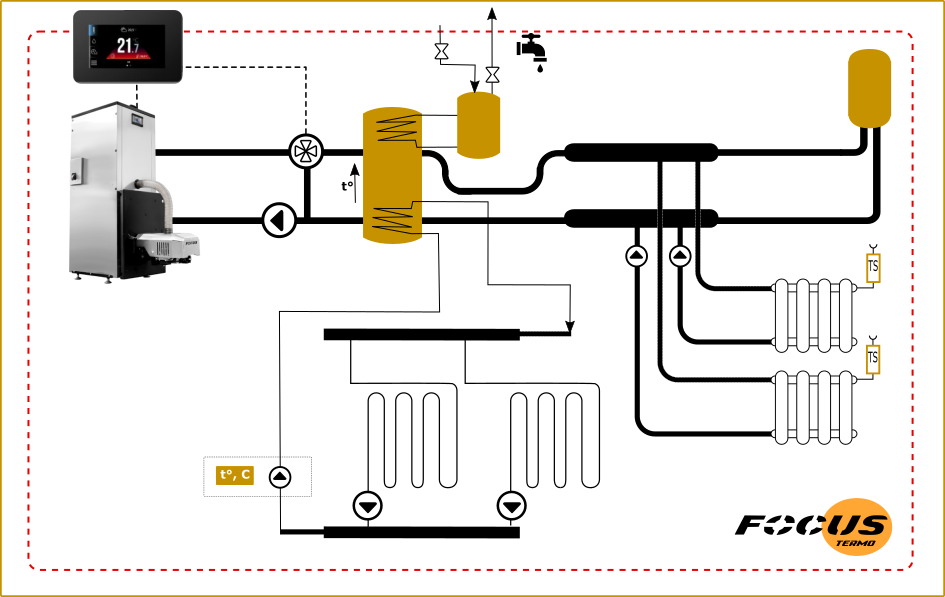Disadvantages of pellet heating: pros and cons of buying a boiler
Some of the disadvantages of pellet heating are so noticeable that consumers initially reject it as a potential heating option. Indeed, they exist. And we will talk about them directly. Pellet heating is an effective and environmentally friendly solution for many consumers, but it is important to consider the disadvantages when deciding to install a pellet heating system.
The most common “cons” of pellet heating:
- High start-up costs: Installing a pellet heating system may require significant initial investment (for a household from 150 to 200 thousand UAH for 25-30 kW in 2024). This includes the purchase of a pellet boiler, as well as the necessary equipment for storing and automatically feeding pellets into the system.
- Dependence on pellet supplier: For reliable operation of a pellet heating system, it is necessary to have constant access to pellets. Supplier dependency can be a problem in some regions where pellets are not readily available or where the market is not well developed. In this case, you need to select boilers designed for pellet ash content of at least 10% (FOCUS pellet boilers for agro granules), in this case you can make artisanal pellets.
- Pellet storage required: Pellets require storage in a dry place, protected from moisture. This may require additional storage space in your home or yard. This requires a dry and minimally heated room, sufficient for installing a pellet bunker, among other things. But you can also buy pellet monoblock boiler FOCUS with built-in hopper and excellent design.
- Regular maintenance required: Like any heating system, pellet boilers and stoves require regular maintenance and cleaning to maintain efficient operation. This may include cleaning the burner, ash pan, and other system components. If you do not want to clean the boiler, purchase self-cleaning boiler model FOCUS (with pneumatic cleaning and ash removal).
- Noise and Vibration: Some models of pellet boilers or stoves may produce noise and vibration during operation. This may be undesirable for some consumers, since the boiler requires installation in a boiler room.
- Electricity dependence: Some pellet systems require electricity to operate the fans, feed the pellets, and control the system. This means that if there is no power, the system may be unavailable or ineffective. Or is it necessary alternative power supply for boilers.
In other words, the disadvantages include the expensive price of the equipment and the need to build a boiler room specifically for heating tasks, as well as the minimum boiler power from 2 to 20-30 kW. That is, if you do not need 20-30 kW for heating, a pellet system should not be considered. If the cost of equipment is scary, then in this case a compact one is recommended. pyrolysis boiler room with backup electric boiler (it will cost about 80 thousand UAH in 2024 with independent installation).
Disadvantages of pellet heating for residential home owners
If you are still considering buying a pellet boiler, but are not sure, check the list of disadvantages of pellet heating with the suggested points. Overall, while pellet heating is an effective and environmentally friendly solution for many consumers, it is important to consider these disadvantages when deciding to install a pellet heating system.
Switching to pellet heating may not be suitable in the following cases:
- High start-up costs: For some consumers, the cost of installing a pellet heating system may be prohibitive, especially if they cannot afford the large upfront costs. Loans are not always justified by energy savings. Use a pyrolysis boiler or an inexpensive stove and electric heating using electrode boilers for heating a small private house.
- There is no space for a boiler room: Pellets require storage in a dry place, protected from moisture. If the consumer does not have enough space to store pellets in the house or on the site, then it is better to refuse the purchase.
- Service and Maintenance Requirements: Pellet boilers and stoves require regular maintenance and servicing to maintain efficient operation. A pellet system for older people will only be interesting if they have an expensive self-cleaning boiler. It is better to install a solar power plant under the “Green Tariff” and electrode boilers on the circuits of the heating system, as well as a solar system for heating underfloor heating and hot water supply.
- In the absence of electricity and alternative sources: Some models of pellet systems require electricity to operate fans and other components. If there are frequent power outages in an area, this can cause problems with the operation of the pellet system. If you are not ready to install a backup power plant, it is better to choose a fireplace heating for comfortable heating, or a more expensive pyrolysis boiler room - you can freely burn garbage in it.
In the end... what to choose?
The bottom line is that pellet boilers are better suited for medium to large households and their owners, who may incur significant upfront costs. For people who have small homes and are older, it is best to avoid the labor-intensive cleaning of soot from heating equipment. In this case you can buy pellet boiler with pneumatic cleaning or choose electric heating with power plant and solar system.
If you cannot afford large expenses, then feel free to choose stove heating with electric backup if connected to electrical networks. All these options allow you to connect climate control and live in comfort.

